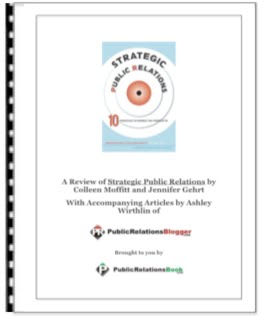________________________________________________________________________
Politics and civil society | The following are some instances of public relations in politics and civil society.
Defining the opponent
A tactic used in political campaigns is known as "defining one's opponent." Opponents can be candidates, organizations and other groups of people.
In the 2004 US presidential campaign, Howard Dean defined John Kerry as a "flip-flopper," which were widely reported and repeated by the media, particularly the conservative media. Similarly, George H.W. Bush characterized Michael Dukakis as weak on crime (the Willie Horton ad) and as hopelessly liberal ("a card-carrying member of the ACLU"). In 1996, President Bill Clinton seized upon opponent Bob Dole's promise to take America back to a simpler time, promising in contrast to "build a bridge to the 21st century." This painted Dole as a person who was somehow opposed to progress.
In the debate over abortion, self-titled pro-choice groups, by virtue of their name, defined their opponents as "anti-choice", while self-titled pro-life groups refer to their opponents as "pro-abortion" or "anti-life".
Managing language
If a politician or organization can use an apt phrase in relation to an issue, such as in interviews or news releases, the news media will often repeat it verbatim, without questioning the aptness of the phrase. This perpetuates both the message and whatever preconceptions might underlie it. Often, something innocuous sounding can stand in for something greater; a "culture of life" sounds like general goodwill to most people, but will evoke opposition to abortion for many pro-life advocates. The phrase "States' rights" was used as a code for anti-civil rights legislation in the United States in the 1960s, and, allegedly, the 70s, and 80s.
Political and Civil Society Public Relations | Use of PR in Politics and Civil Society
________________________________________
Politics and civil society | The following are some instances of public relations in politics and civil society.Defining the opponent
A tactic used in political campaigns is known as "defining one's opponent." Opponents can be candidates, organizations and other groups of people.
In the 2004 US presidential campaign, Howard Dean defined John Kerry as a "flip-flopper," which were widely reported and repeated by the media, particularly the conservative media. Similarly, George H.W. Bush characterized Michael Dukakis as weak on crime (the Willie Horton ad) and as hopelessly liberal ("a card-carrying member of the ACLU"). In 1996, President Bill Clinton seized upon opponent Bob Dole's promise to take America back to a simpler time, promising in contrast to "build a bridge to the 21st century." This painted Dole as a person who was somehow opposed to progress.
In the debate over abortion, self-titled pro-choice groups, by virtue of their name, defined their opponents as "anti-choice", while self-titled pro-life groups refer to their opponents as "pro-abortion" or "anti-life".
Managing language
If a politician or organization can use an apt phrase in relation to an issue, such as in interviews or news releases, the news media will often repeat it verbatim, without questioning the aptness of the phrase. This perpetuates both the message and whatever preconceptions might underlie it. Often, something innocuous sounding can stand in for something greater; a "culture of life" sounds like general goodwill to most people, but will evoke opposition to abortion for many pro-life advocates. The phrase "States' rights" was used as a code for anti-civil rights legislation in the United States in the 1960s, and, allegedly, the 70s, and 80s.
Conveying the message
The method of communication can be as important as a message. Direct mail, robocalling, advertising and public speaking are used depending upon the intended audience and the message that is conveyed. The country of Israel has recently employed a series of Web 2.0 initiatives, including a blog, MySpace page,YouTube channel, Facebook page and a political blog to reach different audiences. The Israeli Ministry of Foreign Affairs started the country's video blog as well as its political blog. The Foreign Ministry held the first microblogging press conference via Twitter about its war with Hamas, with Consul David Saranga answering live questions from a worldwide public in common text-messaging abbreviations. The questions and answers were later posted on IsraelPolitik, the country's official political blog.
The method of communication can be as important as a message. Direct mail, robocalling, advertising and public speaking are used depending upon the intended audience and the message that is conveyed. The country of Israel has recently employed a series of Web 2.0 initiatives, including a blog, MySpace page,YouTube channel, Facebook page and a political blog to reach different audiences. The Israeli Ministry of Foreign Affairs started the country's video blog as well as its political blog. The Foreign Ministry held the first microblogging press conference via Twitter about its war with Hamas, with Consul David Saranga answering live questions from a worldwide public in common text-messaging abbreviations. The questions and answers were later posted on IsraelPolitik, the country's official political blog.
Article Source.
Popular choices
- Non Gamstop Casino
- Mejores Salas De Póker
- Casino Non Aams
- Non Gamstop Casinos
- Siti Casino Online Non Aams
- Migliori Siti Casino Online
- UK Online Casinos Not On Gamstop
- Meilleur Casino En Ligne Live
- Non Gamstop Casino Sites UK
- Non Gamstop Casino Sites UK
- UK Casino Not On Gamstop
- Casinos Not On Gamstop
- Online Casino
- オンラインカジノ
- UK Casino Not On Gamstop
- UK Casino Not On Gamstop
- Reputable Non Gamstop Casinos
- Casinos Not On Gamstop
- Best Non Gamstop Casinos
- Non Gamstop Casino
- Casinos Not On Gamstop
- Slots Not On Gamstop
- Non Gamstop Casino
- Casino Non Aams
- Casinos Not On Gamstop
- Betting Sites Not On Gamstop
- Casino Online Italia
- Casino En Ligne
- Casino En Ligne Belgique
- Siti Scommesse Bitcoin
- KYC 인증 없는 카지노
- Sites De Paris Sportif Fiables
- Casino En Ligne France
- Casino Non Aams Prelievo Immediato
- Meilleur Casino En Ligne Belgique
- Meilleur Casino En Ligne 2026
- Meilleur Casino En Ligne
- Casino En Ligne 2026
- Casino En Ligne France
Subscribe to:
Post Comments (Atom)






Comments (0)
Post a Comment